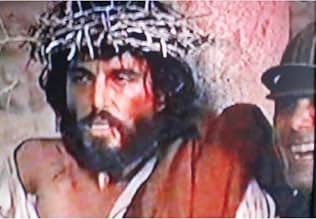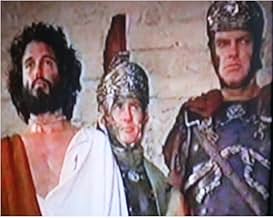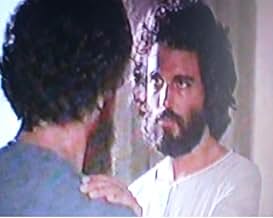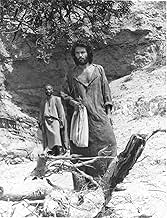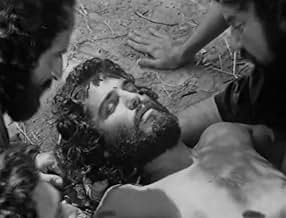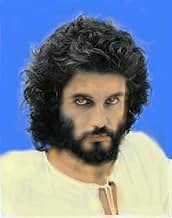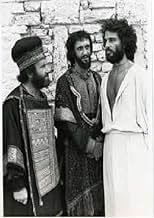Füge eine Handlung in deiner Sprache hinzuThe Crucifixion of Christ seen more from a political and historical point of view than a spiritual one.The Crucifixion of Christ seen more from a political and historical point of view than a spiritual one.The Crucifixion of Christ seen more from a political and historical point of view than a spiritual one.
- Regie
- Drehbuch
- Hauptbesetzung
Empfohlene Bewertungen
This movie is one of the most provocative Jesus movies I have ever seen. It does not seek to tell the whole story, but only to portray an interpretive expression of the last day of Jesus Christ. It is darkly witty, playful and seriously faithful to elements of the Jewish tradition and to modern scriptural interpretation. Judas is much more ordinary than other portrayals, not the dark and sinister evil that we sometimes imagine, but a grossly mistaken man, horribly misguided in his zeal. Chris Saranden's Jesus is playful and serious, faithful and committed--very human while also divine. The final dialog is thoughtfully done and serves as the kind of small talk that two powerful men might do when they have just committed an atrocity. I would watch this movie again and recommend it to others.
This movie is not as good as all the movies of Christ I've ever seen. And I'm quite amazed that in this story Pilate wants to finish Jesus, when the Scriptures (as well the other movies) state differently. It lacks also a very important issue: The Resurrection.. None of the other movies skip this very important part: the faith of all of us Christians lies in this very event. As Paul says in one of his letters "If Christ did not rise from the dead, our faith is vain". A very impressive scene for me in this movie was seeing on the streets the remains of the palms that were used when Jesus entered Jerusalem.
Finally, and in opposition to my Jewish co-commentator, Jesus WAS NOT a myth. And as a matter of fact, he was also a JEW. There are plenty of documents (relgious and secular) that prove the existence of this extraordinary man(or should I said, God become a man) that indeed changed mankind. I strongly advise him(given he is a historian) to read about Flavius Josephus, the most brilliant Jewish commentator of the 1st. Century.
Finally, and in opposition to my Jewish co-commentator, Jesus WAS NOT a myth. And as a matter of fact, he was also a JEW. There are plenty of documents (relgious and secular) that prove the existence of this extraordinary man(or should I said, God become a man) that indeed changed mankind. I strongly advise him(given he is a historian) to read about Flavius Josephus, the most brilliant Jewish commentator of the 1st. Century.
After seeing this movie once,I really respected Jesus Christ much more than I used to. Even though others may compare this movie a failed attempt with other biblical movies, I enjoyed Sarandon's portrayal of Christ.
This movie strikes me as one of the most successful attempts ever at coming up with plausible answers for some of the nagging questions that have cropped up in recent scholarship concerning the "Passion" (suffering and death of Christ) accounts in the New Testament. (What motivated Judas if money was not the issue? What could bring the Sanhedrin to meet on a high holy day? Why did Pilate waffle?) It is a movie for the serious, thinking Christian: fans of "The Passion of the Christ" will no doubt be disappointed by the lack of gory spectacle and arch characterization. As for myself, I find the portrait painted here--of the willingness of ordinary people to so blithely sacrifice common decency when their own self-interest is at stake--far more realistic and deeply unsettling. (The disinterested, "just doing my job" look on the face of the man who drives the first nail in Christ's wrist is as chilling as any moment in film.) The film makes no claim to "authenticity", but the settings and costuming invariably feel more "right" than many more highly acclaimed efforts. It is a slow film but, if you accept its self-imposed limits (it is, after all, "The Death"--not the Life--"of Christ"), ultimately a very rewarding one.
This is the most depressing film on Jesus Christ that I already viewed. Not only the most depressing, but I force (I don't eat Passion of the Christ of Mel Gibson, it is clear). Until today I don't understand which was the intention of the producing of do a film as this, different from all the other films on Christ done already. Here in this film Jesus (Chris Sarandon) it is just shown as human man, and no divine, that it is determined until the end in accomplishing his/her mission. It is also with physical lines (little accepted by most of the people) like Jesus it was very probably: a brunet man, of dark brown eyes, of rustic appearance, and not of hair blond or brown clear, of delicate face and of blue eyes as most imagines, in short, in this film Jesus is shown as a natural man from Palestine of the first century of ours was and not with European lines, as they were Franco Zeffirelli's Jesus in "Jesus of Nazareth" and of "King of Kings." And he was not shown like a solemn Jesus, reverent as it was in the other films, but a more human Jesus totally naked of any divinity. The same I say of Last Supper scenes and prayer in the garden of Gethsemani. In the scenes of the judgment, of the flagellation, Jesus is treated with such a ferocious hate shown never in other films. Jesus is viewed as somebody that has be punished severely and dead the more quickly in a more intense way than in other films. I remember of the scene, in that Caiaphas says Jesus soon at the end of the judgment: "And you don't forget that you are a Jew! " It is also of the scenes In that king Herod says for Jesus: "You are not a king of anything!!! Monarch of anybody!!! That more ridiculous king you would be!!!! " And all make fun of Jesus. Before "Passion of the Christ" of Mel Gibson, this had been the most violent film on the last of Jesus that it had already viewed. In this film Jesus is treated with end hate, contempt and ridiculed in such a cruel and merciless way that he left me very impressed and it finishes completely defeated, treaty as the vilest and despicable of all the criminals. I didn't like nor a little of this film. This film is very depressing, revolting and sad...
Wusstest du schon
- WissenswertesBoth Tony Vogel(Temple Guard) and Keith Michell(Pontius Pilate) have been also involved in three other Biblical portrayals.....Vogel portrayed Andrew in Jesus Of Nazareth in 1977 and in 1999 TV movie Jesus portrays a farmer.....Michell portrayed Jacib in 1974 in The Story of Jacob and Joseph and in 1977 portrays King David in The Story of David.
- Crazy CreditsThe 20th Century Fox Television logo is shown without the fanfare.
- VerbindungenReferenced in Saturday Night Live: Richard Benjamin, Paula Prentiss/The Grateful Dead (1980)
Top-Auswahl
Melde dich zum Bewerten an und greife auf die Watchlist für personalisierte Empfehlungen zu.
Details
- Erscheinungsdatum
- Herkunftsland
- Sprache
- Auch bekannt als
- El día en que murió Cristo
- Drehorte
- Tunesien(filmed entirely on location in Tunisia)
- Produktionsfirma
- Weitere beteiligte Unternehmen bei IMDbPro anzeigen
- Laufzeit
- 2 Std. 22 Min.(142 min)
- Farbe
- Seitenverhältnis
- 1.33 : 1
Zu dieser Seite beitragen
Bearbeitung vorschlagen oder fehlenden Inhalt hinzufügen

